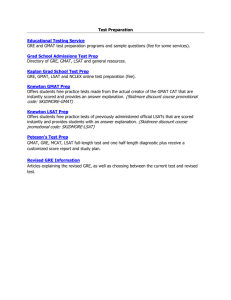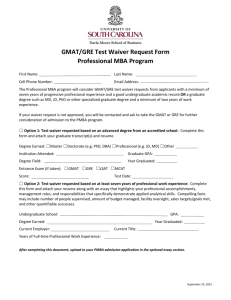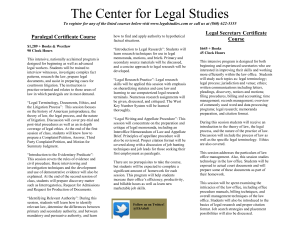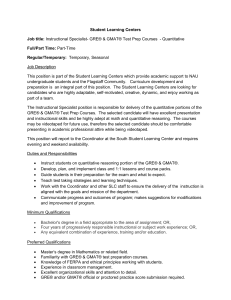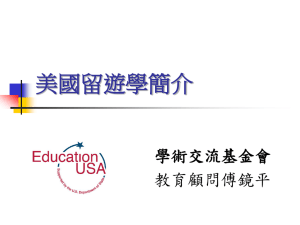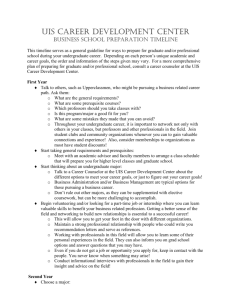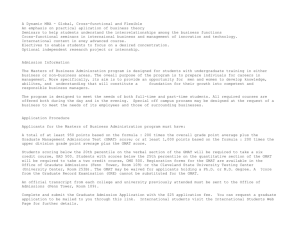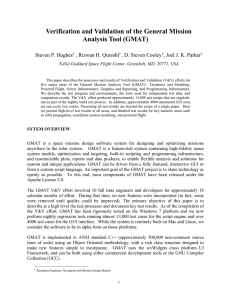VBAT preparation document
advertisement
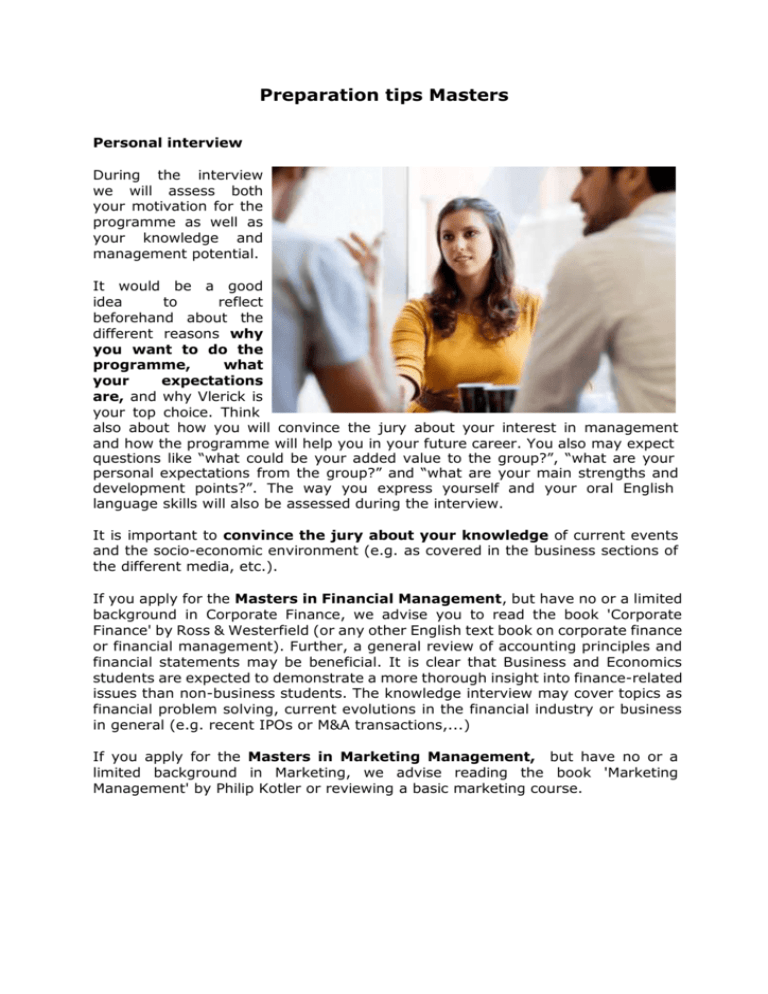
Preparation tips Masters Personal interview During the interview we will assess both your motivation for the programme as well as your knowledge and management potential. It would be a good idea to reflect beforehand about the different reasons why you want to do the programme, what your expectations are, and why Vlerick is your top choice. Think also about how you will convince the jury about your interest in management and how the programme will help you in your future career. You also may expect questions like “what could be your added value to the group?”, “what are your personal expectations from the group?” and “what are your main strengths and development points?”. The way you express yourself and your oral English language skills will also be assessed during the interview. It is important to convince the jury about your knowledge of current events and the socio-economic environment (e.g. as covered in the business sections of the different media, etc.). If you apply for the Masters in Financial Management, but have no or a limited background in Corporate Finance, we advise you to read the book 'Corporate Finance' by Ross & Westerfield (or any other English text book on corporate finance or financial management). Further, a general review of accounting principles and financial statements may be beneficial. It is clear that Business and Economics students are expected to demonstrate a more thorough insight into finance-related issues than non-business students. The knowledge interview may cover topics as financial problem solving, current evolutions in the financial industry or business in general (e.g. recent IPOs or M&A transactions,...) If you apply for the Masters in Marketing Management, but have no or a limited background in Marketing, we advise reading the book 'Marketing Management' by Philip Kotler or reviewing a basic marketing course. Both books can be borrowed at the Vlerick library for free. To assess your marketing flair, you are often asked in the interview to reflect on the marketing aspects related to a company or brand that is in the news, or a company mentioned on your CV. The depth of questions often depends on your background (e.g. if you have an economics background the jury will expect you to know some marketing concepts, if you have a very non-marketing related background the jury will much more assess to what extent you can think and reason as a marketeer). If you apply for the Masters in Innovation and Entrepreneurship, we will test your interest in the start-up environment and more generally innovation as driver for corporate renewal and competitiveness. We will also look into behaviour that demonstrates your potential to be entrepreneurial or innovative. If you apply for the Masters in International Management and Strategy, we will test your interest in international business and current trends that impact businesses on a worldwide level. We will also look into behavior that demonstrates your potential to think across borders and to act as a global citizen. The analytical test The analytical test is a computer based, multiple choice test. It assesses whether you can quickly read and interpret business data. The analytical test differs from the GMAT/GRE in that it focuses on analytical skills only, not on verbal reasoning or other types of skills. Moreover, the mathematical part of the GMAT/GRE primarily involves pure calculations, which is not the case in our analytical test. It is included in the admissions test because of the importance of this type of reasoning for successful participation in our degree programmes (many courses require this type of analytical insight). It will take you 20 minutes. You do not need to prepare for this test. Sample questions: Most important reasons for staff absence in 2005 Illness/ reason of absence Stress/ Depression Hospital admissions Cold Infection Injury Stomach symptoms Severe illness TOTAL Number of absence cases 94 88 1307 123 92 406 56 2166 Number of missed workdays 3478 3143 2886 1989 1723 917 864 15000 1. What is the percentage of missed workdays due to stress/depression and hospital admission in relation to total missed workdays? 1. 2. 3. 4. 44,14 % 23,19 % 20,95 % 8,4 % 2. In the first six months of 2006 there was a monthly average of 189 absence cases. How many cases should occur in the final 6 months so that there are as many absence cases in 2006 as in 2005? 1. 2. 3. 4. 1977 1134 102 1032 3. For which reason were the average missed workdays the highest? 1. 2. 3. 4. Hospital admission Injury Stress/depression Infection 4. The average cost of an employee’s missed workday was EUR132. What was the average cost of an absence case due to stomach symptoms in 2005? 1. 2. 3. 4. EUR 298,14 EUR 53 592,00 EUR 121 044,00 EUR 2 036,57 You can try a numerical reasoning test example by clicking on this link: http://be.hudson.com/en-gb/knowledgecentre/hudsonrd/testourhrtools GMAT or GRE test and English language test If you are unable to attend one of our VBAT dates, you can apply with a GMAT or GRE score and take an additional English language test. GMAT : You’ll need a GMAT score of 600 or more and balanced results for the verbal and quantitative parts. When you sign up for the GMAT, make sure you select Vlerick Business School in the list. More info & registration. GRE: You’ll need a GRE scaled score of 154 or more for the verbal part (61%) and 155 or more for the quantitative part (64%). When you sign up, make sure you submit our school code 7176. More info & registration. If your score is lower, you’ll need to demonstrate other strengths such as excellent study results or other achievements. You can take one of the following English language tests: - TOEFL (minimum 100 internet-based or 600 paper-based; use our code 7176) TOEIC (minimum 720) IELTS (minimum band 6.5) PTE (minimum 68) CAE (minimum 58)
